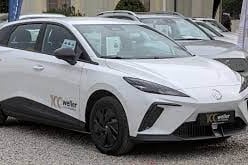There are almost a million fully electric vehicles (EVs) and half a million hybrid vehicles on the road in the UK. Businesses are increasingly switching to electric car or van fleets to save money on fuel and reduce their carbon emissions. Yet there are still many misconceptions about EVs.
The myth that EVs emit more CO2 emissions arose because EVs have higher emissions in their manufacture, due to making the batteries.
Yet most of a car’s emissions come from burning fuel not its manufacture. Just two years of burning petrol or diesel while driving releases more CO2 than car manufacture.
How much CO2 an EV saves depends on the emissions from the grid. The UK Government has committed to all our electricity coming from low carbon sources by 2035.
EVs do not pollute through tailpipe emissions, meaning cleaner, healthier air for your family inside the car and the wider neighbourhood.
Particulate pollution from brake wear is lower in EVs because they have regenerative braking. Tyre wear is similar between EVs and petrol cars, and less on small cars. Reducing driving speed and acceleration and braking reduces particulate emissions in all cars.
Potholes and damage to bridges and road infrastructure are caused by increased traffic loads, and more vans and SUVs on our roads.
EVs are heavier than their equivalent petrol model, due to the weight of the battery, but are lighter than an SUV. The trend for all cars is to get bigger and heavier, with SUVs being the heaviest by far. Smaller EVs like the MG4, electric Mini and electric Fiat 500 are coming onto the market.
The biggest scare story is that EVs will catch fire. All cars can catch fire, but EVs are 20 times less likely to catch fire than petrol and diesel cars. Despite the rumours that circulated online following the Luton Airport fire, the Bedfordshire Fire and Rescue Service reported that the fire was started by a diesel car.
Batteries are a new technology and attract a lot of scrutiny. They are lasting much longer than was predicted; most EVs currently on the market have an eight- to ten-year battery warranty. Producers are obliged to take back EV batteries free of charge at the end of their life and ensure they are recycled according to regulatory standards – given the value of battery materials, it’s in their commercial interest to recycle them. Laws ban the disposal of batteries in landfill.
Another myth is that EVs require more mining for battery materials. Burning petrol and diesel requires continuous oil drilling, refining and shipping around the world.
The oil industry has a terrible track record of environmental destruction, and damage to the climate and the Earth’s systems that support all life.
A litre of oil cannot be recycled, but battery materials are recycled. Lithium is not in short supply, the largest exporter is Australia, there are even plans to produce lithium in Cornwall. Cobalt is a rare element that is widely used in electronics and in oil refining, and the valuable cobalt in batteries is recycled.
A more practical concern is that EVs don’t have sufficient range. Many EVs now offer 200 miles even in poor conditions and some can do 300 miles. On average, EV owners charge their car once or twice a week at home or at work. If you do not have off-road parking, rapid chargers are now being installed in car parks across the region, a search on Zap Map will show you what is available in your neighbourhood. For longer journeys, a rapid charger can add 120 miles of range in just a 20-minute charge.
Lastly, there is the assumption that EVs are unaffordable. The running costs of EVs are much lower, making their lifetime cost of ownership lower than for a petrol or diesel car. Used EVs are within reach for many people. For information you can trust, ask EV-driving family members, friends, neighbours and work colleagues about their first-hand experience.
Surveys show that once people have driven electric they don’t switch back; this alone should dispel many of the above myths.
EVs are a disruptive technology, meaning that there are many players from oil companies to oil producing countries who have a huge financial incentive in keeping the internal combustion engine on the road and perpetuating the myths that surround EVs.




